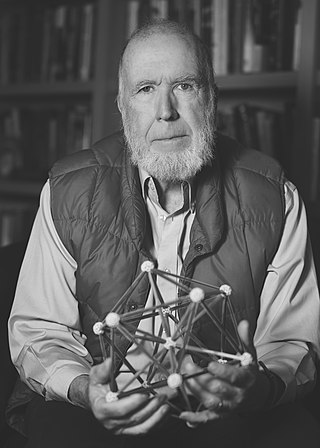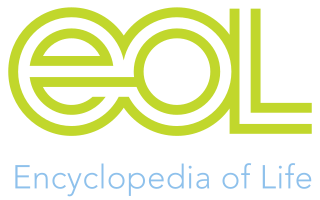Related Research Articles

In biological phylogenetics, a clade, also known as a monophyletic group or natural group, is a grouping of organisms that are monophyletic – that is, composed of a common ancestor and all its lineal descendants – on a phylogenetic tree. In the taxonomical literature, sometimes the Latin form cladus is used rather than the English form. Clades are the fundamental unit of cladistics, a modern approach to taxonomy adopted by most biological fields.

Life is a quality that distinguishes matter that has biological processes, such as signaling and self-sustaining processes, from matter that does not. It is defined descriptively by the capacity for homeostasis, organisation, metabolism, growth, adaptation, response to stimuli, and reproduction. All life over time eventually reaches a state of death, and none is immortal. Many philosophical definitions of living systems have been proposed, such as self-organizing systems. Viruses in particular make definition difficult as they replicate only in host cells. Life exists all over the Earth in air, water, and soil, with many ecosystems forming the biosphere. Some of these are harsh environments occupied only by extremophiles.

Nature is an inherent character or constitution, particularly of the ecosphere or the universe as a whole. In this general sense nature refers to the laws, elements and phenomena of the physical world, including life. Although humans are part of nature, human activity or humans as a whole are often described as at times at odds, or outright separate and even superior to nature.
In biology, taxonomy is the scientific study of naming, defining (circumscribing) and classifying groups of biological organisms based on shared characteristics. Organisms are grouped into taxa and these groups are given a taxonomic rank; groups of a given rank can be aggregated to form a more inclusive group of higher rank, thus creating a taxonomic hierarchy. The principal ranks in modern use are domain, kingdom, phylum, class, order, family, genus, and species. The Swedish botanist Carl Linnaeus is regarded as the founder of the current system of taxonomy, as he developed a ranked system known as Linnaean taxonomy for categorizing organisms and binomial nomenclature for naming organisms.

Natural science is one of the branches of science concerned with the description, understanding and prediction of natural phenomena, based on empirical evidence from observation and experimentation. Mechanisms such as peer review and reproducibility of findings are used to try to ensure the validity of scientific advances.

Biodiversity is the variability of life on Earth. It can be measured on various levels. There is for example genetic variability, species diversity, ecosystem diversity and phylogenetic diversity. Diversity is not distributed evenly on Earth. It is greater in the tropics as a result of the warm climate and high primary productivity in the region near the equator. Tropical forest ecosystems cover less than one-fifth of Earth's terrestrial area and contain about 50% of the world's species. There are latitudinal gradients in species diversity for both marine and terrestrial taxa.

Sir David Frederick Attenborough is a British broadcaster, biologist, natural historian, and writer. He is best known for writing and presenting, in conjunction with the BBC Studios Natural History Unit, the nine nature documentary series forming the Life collection, a comprehensive survey of animal and plant life on Earth.

Stewart Brand is an American project developer and writer, best known as the co-founder and editor of the Whole Earth Catalog. He has founded a number of organizations, including the WELL, the Global Business Network, and the Long Now Foundation. He is the author of several books, most recently Whole Earth Discipline: An Ecopragmatist Manifesto.

The natural environment or natural world encompasses all biotic and abiotic things occurring naturally, meaning in this case not artificial. The term is most often applied to Earth or some parts of Earth. This environment encompasses the interaction of all living species, climate, weather and natural resources that affect human survival and economic activity. The concept of the natural environment can be distinguished as components:

Kevin Kelly is the founding executive editor of Wired magazine and a former editor and publisher of the Whole Earth Review. He has also been a writer, photographer, conservationist, and student of Asian and digital culture.

Wikispecies is a wiki-based online project supported by the Wikimedia Foundation. Its aim is to create a comprehensive open content catalogue of all species; the project is directed at scientists, rather than at the general public. Jimmy Wales stated that editors are not required to fax in their degrees, but that submissions will have to pass muster with a technical audience. Wikispecies is available under the GNU Free Documentation License and CC BY-SA 4.0.
ARKive was a global initiative with the mission of "promoting the conservation of the world's threatened species, through the power of wildlife imagery", which it did by locating and gathering films, photographs and audio recordings of the world's species into a centralised digital archive. Its priority was the completion of audio-visual profiles for the c. 17,000 species on the IUCN Red List of Threatened Species.
The Catalogue of Life is an online database that provides an index of known species of animals, plants, fungi, and microorganisms. It was created in 2001 as a partnership between the global Species 2000 and the American Integrated Taxonomic Information System. The Catalogue is used by research scientists, citizen scientists, educators, and policy makers. The Catalogue is also used by the Biodiversity Heritage Library, the Barcode of Life Data System, Encyclopedia of Life, and the Global Biodiversity Information Facility. The Catalogue currently compiles data from 165 peer-reviewed taxonomic databases that are maintained by specialist institutions around the world. As of September 2022, the COL Checklist lists 2,067,951 of the world's 2.2m extant species known to taxonomists on the planet at present time.

The Encyclopedia of Life (EOL) is a free, online encyclopedia intended to document all of the 1.9 million living species known to science. It aggregates content to form "pages" for every known species. Content is compiled from existing trusted databases which are curated by experts and it calls on the assistance of non-experts throughout the world. It includes video, sound, images, graphics, information on characteristics, as well as text. In addition, the Encyclopedia incorporates species-related content from the Biodiversity Heritage Library, which digitizes millions of pages of printed literature from the world's major natural history libraries. The BHL digital content is indexed with the names of organisms using taxonomic indexing software developed by the Global Names project. The EOL project was initially backed by a US$50 million funding commitment, led by the MacArthur Foundation and the Sloan Foundation, who provided US$20 million and US$5 million, respectively. The additional US$25 million came from five cornerstone institutions—the Field Museum, Harvard University, the Marine Biological Laboratory, the Missouri Botanical Garden, and the Smithsonian Institution. The project was initially led by Jim Edwards and the development team by David Patterson. Today, participating institutions and individual donors continue to support EOL through financial contributions.

The branches of science, also referred to as sciences, scientificfields or scientific disciplines, are commonly divided into three major groups:

A species is a population of organisms in which any two individuals of the appropriate sexes or mating types can produce fertile offspring, typically by sexual reproduction. It is the basic unit of classification and a taxonomic rank of an organism, as well as a unit of biodiversity. Other ways of defining species include their karyotype, DNA sequence, morphology, behaviour, or ecological niche. In addition, paleontologists use the concept of the chronospecies since fossil reproduction cannot be examined. The most recent rigorous estimate for the total number of species of eukaryotes is between 8 and 8.7 million. About 14% of these had been described by 2011. All species are given a two-part name, called a "binomial". The first part of a binomial is the genus to which the species belongs. The second part is called the specific name or the specific epithet. For example, Boa constrictor is one of the species of the genus Boa, with constrictor being the species' epithet.
An all-taxa biodiversity inventory, or ATBI, is an attempt to document and identify all biological species living in some defined area, usually a park, reserve, or research area. The term was coined in 1993, in connection with an effort initiated by ecologist Daniel Janzen to document the diversity of the Guanacaste National Park in Costa Rica.

The biodiversity of Wales is the wide variety of ecosystems, living organisms, and the genetic makeups found in Wales.

Rights of nature or Earth rights is a legal and jurisprudential theory that describes inherent rights as associated with ecosystems and species, similar to the concept of fundamental human rights. The rights of nature concept challenges twentieth-century laws as generally grounded in a flawed frame of nature as "resource" to be owned, used, and degraded. Proponents argue that laws grounded in rights of nature direct humanity to act appropriately and in a way consistent with modern, system-based science, which demonstrates that humans and the natural world are fundamentally interconnected.
The Earth BioGenome Project (EBP) is an initiative that aims to sequence and catalog the genomes of all of Earth's currently described eukaryotic species over a period of ten years. The initiative would produce an open DNA database of biological information that provides a platform for scientific research and supports environmental and conservation initiatives. A scientific paper presenting the vision for the project was published in PNAS in April 2018, and the project officially launched November 1, 2018.
References
- ↑ "A Call for the Discovery of All Life-Forms on Earth". All Species Foundation. Archived from the original on 2 February 2007. Retrieved 28 July 2019.
- 1 2 Kelly, Kevin. "Biography". Kevin Kelly. Archived from the original on 2019-05-18. Retrieved 28 July 2019.
- ↑ Hitt, Jack (December 9, 2001). "THE YEAR IN IDEAS: A TO Z.; The All-Species Inventory". The New York Times. Retrieved 28 July 2019.
- ↑ Gewin, Virginia. "All living things, online". Nature. Springer Nature. Retrieved 28 July 2019.
- ↑ "History". All Species Foundation. Archived from the original on 4 February 2007. Retrieved 28 July 2019.
- ↑ "Letter to the All Species Foundation" (PDF). Archived from the original (PDF) on 2019-07-28.